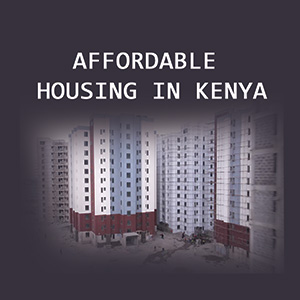How to Get Affordable Housing in Kenya
4 min read
Affordable Housing in Kenya
A major problem in Kenya is affordable housing since many people fight to locate decent, reasonably priced houses. By means of several initiatives, the government has been striving to guarantee Kenyans access to reasonably priced houses. This article provides you with information on how to find affordable housing in Kenya, what you need to have to get them, the distinctions between social and affordable housing, the difficulties the sector faces, who is liable for the housing tax, and rural Kenya’s housing prices.
Who Qualifies for Affordable Housing Relief?
The Kenyan government has instituted relief for affordable housing. To be qualified, one should meet the following requirements:
1. Kenyan Citizenship
The program is only available if you are a Kenyan citizen.
2. Income Bracket
Usually aiming at poor to middle-income individuals, usually below Ksh 150,000 per month, the program
3. First-time house buyers
Government affordable houses are given preference as they do not already own any.
4. Contribution to Housing Levy
Government-sponsored affordable housing projects give employees who help to fund the Housing Levy.
5. Registration on the Boma Yangu Platform
Applying for reasonably priced homes requires candidates to register on the official government housing site, Boma Yangu.
Once enrolled, candidates are evaluated according to income level and contribution histories—those who satisfy the necessary financial criteria.
What is the Difference Between Social Housing and Affordable Housing in Kenya?
Though they have different purposes, social and affordable housing in Kenya seeks to offer low-cost housing alternatives.
1. Social Housing
- Designed for very low-income earners—that is, those making less than Ksh 20,000 a month.
- There are rent-regulated apartments offered at low rates.
- Mainly funded by NGOs and the government.
- Projects include low-cost rental housing and slum upgrading projects in areas like Mukuru slums in Nairobi.
2. Affordable Housing
- Targets poor to middle-income people. Usually, individuals make between Ksh 20,000 and Ksh 150,000 per month.
- Offered by government
- It involves mortgage-based or rent-to-own financing options.
- Examples include the Big 4 Agenda’s Affordable Housing Program.
Although both kinds of housing try to lower the housing shortage, affordable housing offers more ownership, while social housing mostly provides renting options for very low-income households.
What are the challenges facing affordable housing in Kenya?
Through efforts to increase affordable housing programs, many challenges have been experienced :
They include:
High Land Costs
Urban developers find it costly to build affordable houses while land values remain high.
Bureaucratic Delays
Long approval times for land purchases and building licenses hold down house construction.
Lack of Adequate Infrastructure
Large-scale affordable housing projects are hampered by inadequate infrastructure including bad road networks, water scarcity, and erratic electrical availability.
Corruption and Mismanagement
Mismanagement and corruption have slowed down housing projects using misallocated cash and unethical land dealings.
Low Mortgage Uptake
Strict loan criteria and hefty interest rates mean many Kenyans cannot afford mortgage finance.
Public Skepticism
Many Kenyans are wary of government schemes after past botched housing projects.
Unstable Economy
Variations in building material pricing and inflation raise project expenses generally.
Dealing with these challenges requires both the government and private sectors to develop better financial models to make homeownership more accessible.
Who is Eligible to Pay the Housing Levy in Kenya?
The Housing Levy was instituted by the Kenyan government to support initiatives for affordable housing projects. The levy applies to:
Employees in Formal Employment
With an equal contribution from their companies, all salaried employees pay 1.5% of their gross pay.
Self-employed people
Those who get a good income through self-employment are encouraged to contribute.
Companies
Must ensure their employees are involved in House Levy’s contribution to the government from their income.
The money gathered from the housing levy is directed toward supporting government-owned housebuilding projects. If contributors do not buy a house through the scheme, they can utilize their savings to buy residences or withdraw the money upon retirement.
What is the Most Affordable Housing in Kenya?
The location, size, and kind of unit affect the cost. Among Kenya’s most reasonably priced affordable housing options are:
Government Affordable Housing Units
Priced from Ksh 600,000 for one-bedroom units, government affordable housing units are residences under the Affordable Housing Program.
Housing Cooperatives and SACCOS
Many cooperatives provide reasonably priced home financing choices, therefore enabling members to buy homes at reduced rates. SACCOS is one such cooperative.
Slum Upgrading Projects
Low-cost rental accommodation built by the government in collaboration with NGOs aims to raise living standards in informal areas.
Container Houses
Conversion of shipping containers into dwellings is a rising trend with units ranging in value from Ksh 300,000 to Ksh 1,000,000.
Prefabricated Houses
Built using factory-made materials and erected on-site at a reduced cost than conventional building, prefabricated houses are modern, reasonably priced residences.
For those trying to acquire or rent a house within their budget, these choices offer reasonably price.
How Much Does a 2-Bedroom House Cost in Rural Kenya?
Because of reduced land and labor expenses, building a house in rural Kenya is sometimes less expensive. The cost of building a two-bedroom house will depend on elements including labor expenses, location, and material choice.
- Ksh 200,000 – Ksh 500,000 Basic Traditional House (Mabati & Timber)
- Ksh 300,000 for a brick or mud house
- Ksh 800,000 – Ksh 1.5 Million Simple Stone House
- Modern 2-Bedroom House (Concrete & Roofing Tiles): Ksh 1.5 Million – Ksh 3 Million
Extra expenses, including water, energy, and interior finishing, could stretch the whole budget. Rural housebuilding is still far less expensive than in cities.
Conclusion.
For people looking for affordable houses, check through Boma Yangu and investigate financing choices through banks, SACCOs, or self-building, which can be excellent paths to becoming homeowners in Kenya.




